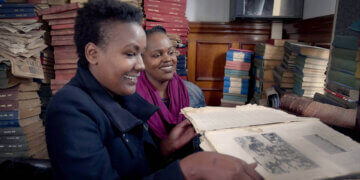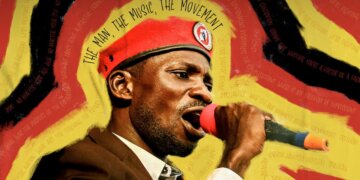With his captivating approach to socio-political storytelling, Kenyan documentary filmmaker Sam Soko has developed content and collaborated with firebrand artists worldwide. His first feature documentary project, Softie, Boniface Mwangi’s story about balancing the deep love for country with the family’s needs, premiered at the 2020 Sundance Film Festival, winning a Special Jury Prize for Editing. Soko has received Emmy, Peabody, and PGA nominations for his work. He is also co-founder of LBx Africa, a Kenyan production company that works with local and international filmmakers to bring uniquely African perspectives to global audiences. His latest documentary, Free Money, available on Netflix, grapples with tough questions about the implications of foreign intervention in local economies and the aftermath of lofty promises. In the words of the directors Soko and Lauren de Fillipo, “Free Money bridges the chasm between two drastically different realities, unfolding a captivating story as two distinct worlds meet head-on.”
In this conversation with Sinema Focus, Abigail Arunga speaks to Soko about the making of Free Money, his thoughts on UBI and his unwavering love for documentaries.
I have to ask, what did you think of Universal Basic Income (UBI) before this film?
Isn’t it surprising to hear about a program that promises to give people money with no strings attached? I was initially sceptical. In my experience, there’s always a catch. When my co-director Lauren brought the story to my attention, I knew I had to see it for myself. Having worked extensively in the documentary field, I’ve spent a lot of time filming NGOs and have seen both their successes and shortcomings.
This situation, however, was unique; it was more complex. Cash interventions can be incredibly empowering, offering people immediate and tangible benefits. Yet, when distributed through the traditional NGO model, it’s not sustainable and is subject to various challenges, including agency for recipients, and accountability.
The alternative isn’t much better. Trust in African governments is extremely low, especially when it comes to financial matters. Even if there were trust, many governments don’t have the financial resources to implement an effective UBI.
Moreover, money isn’t a panacea. People still require affordable or free healthcare and education. So, in summary, the issue is incredibly complicated.
How do you think Free Money reflects on labour and work in Kenya, like what people are paid, how people are living, how many people are ‘poor’?
The term ‘poor’ is often problematically simplified, ignoring the spectrum of poverty that exists. At one end, there are those living in extreme poverty, who lack basic necessities like food, health care, and any form of income. In contrast, some in rural areas might own land and a home but struggle to afford education or medical care. Then there are those who are, as Boniface Mwangi puts it, ‘one phone call away from poverty.’ UBI aims to address this diverse range of needs, providing a financial safety net that allows individuals to cover essential expenses and invest in their future.
What informed the choice to have Larry Madowo as a lofty observer in this film?
Larry is exceptionally well-connected in the economic sector, having served as the Africa Business Editor for the BBC for several years. He’s not only a seasoned journalist, but also hails from a village near Kogutu, where our story is set. This geographic and cultural proximity has made him a familiar and trusted face in the community. Additionally, Larry was keenly interested in understanding the macro and micro dynamics at play, which made for a strong alignment of interests between us.
Why did the film take so long to make? You do seem to be a fan of documentaries that take a while to make, though, is that a thing?
Great stories take time to unfold. We must exercise patience and allow life, the ultimate storyteller, to paint its tale on the canvas of time. Also, building trust is a slow process, and we often encounter obstacles that force us to adapt. It’s crucial to honour the timeline of these events to experience genuine transformation in our own narratives. Remember, this is just the beginning; we still have a long way to go.
Why documentaries? What is it about this genre that keeps you coming back?
Documentaries that explore the complexities of real life captivate me because I find truth is often stranger, and more intriguing than fiction. I’m passionate about contributing to the chronicle of human experience, capturing its many hues and transformations. By expressing our true selves, we not only learn from one another but also help preserve history, filling gaps left by our historical absence of recorded narratives. This is my modest contribution to that ongoing effort.
In a space like film in Kenya, where often funders are hard to find, how does one fund a 5-year film project? How can other people access this funding?
Navigating the funding landscape for filmmaking is no small feat. Although organisations like Docubox, Documentary Africa (DocA), and the Kenya Film Commission provide some financial relief, their support often barely scratches the surface of the actual costs involved. This leaves many creators resorting to grant applications, accruing debt, and seeking external financiers who resonate with our storytelling ambitions—a challenging and risky endeavour. We argue that the path to long-term sustainability hinges on shifting the perspective of local investors including the government. Unfortunately, the prevailing view in the continent is that artists are hobbyists rather than viable entrepreneurs. This mindset needs to evolve, especially given the tremendous global potential of the industry.
What are some of the things you saw that moved you when filming Free Money, that maybe didn’t make it to the final cut?
There was a lot that didn’t make it! We captured footage of various families, each with their own unique stories and storylines. Hopefully, they will be featured in upcoming instalments of this film series.
After making the film, do you think UBI is a good idea?
That’s the golden question (hahaha). UBI is a great idea but it’s not a silver bullet. We created Free Money to spark conversations about the complexities of implementing UBI in an African context. While Europe and the U.S. have their own sets of challenges and advantages, the dynamics in Africa are unique. Key factors like sustainable development, availability of resources, and the presence of effective governance and affordable healthcare and education are essential in poverty alleviation.
Based on my own observations, the financial support from UBI can be truly transformative. However, implementing UBI needs government involvement and we don’t trust the government. Moreover, there’s complications due to existing societal biases and mistrust towards the poor people.
Our next part of the film series looks at the subject from a more global level and how things are evolving in the subject.
What’s next, Sam? Do we need to wait another five years for your next project?
Hahaha! Probably not in 5 years, but we have a few projects in the pipeline that will hopefully be coming out next year. So, keep an eye out.
Enjoyed this article?
To receive the latest updates from Sinema Focus directly to your inbox, subscribe now.











